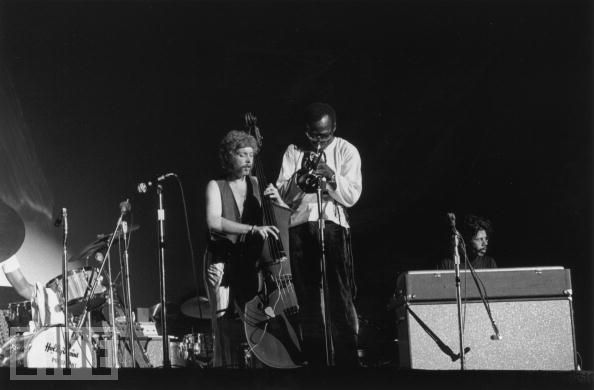I’m truly looking forward to an amazing show tomorrow night with Dave Holland’s Overtone Quartet. Of all the great jazz bassists to emerge since the late 60s, for me, Holland is at the top of the list. There are, of course, dozens of other truly incredible bassists, but for his stunning playing, superlative writing and knack for consistently choosing adventurous and rewarding projects, Holland stands alone. He had the daunting task of following Ron Carter into Miles Davis’ band in 1968 (at the age of 22), and Davis’ studio albums with Holland are now considered some of the most pivotal works in jazz history: Filles de Kilimanjaro, In a Silent Way, Bitches Brew. No serious jazz collection is complete without them. The live Fillmore East and West recordings from Holland’s two-year tenure with Miles are also certainly worth investigating.
After leaving Miles in the early 70s, Holland began a long association with Manfred Eicher’s ECM Records, deftly blurring lines between the avant garde and more traditional jazz composition. I was constantly playing his records with the Gateway Trio (including guitarist John Abercrombie and drummer Jack DeJohnette) and Circle (with saxophonist Anthony Braxton, pianist Chick Corea and drummer Barry Altschul) during my college years. Later, I became a huge fan of the criminally underrated trumpeter Kenny Wheeler and his ECM albums that featured Holland, particularly Deer Wan, Gnu High and Double, Double You, with a cast of sidemen including pianist Keith Jarrett, saxophonist Jan Garbarek and a young Michael Brecker.
Dave Holland with Miles Davis, 1969
|
Over the years, Holland’s own sessions on ECM, and now his Dare2 label, have run the gamut from third stream improvisational frameworks to tightly structured ensemble writing, and his scope as a musician and composer has encompassed settings from solo bass to big band and everything in between. His work in the 1980s was happily devoid of the bebop revivalist approach that characterized the mainstream jazz of the time, and he was an early champion of many of the musicians who would rise to prominence in the 80s, including Steve Coleman, Kevin Eubanks and Marvin “Smitty” Smith. Notable albums include Seeds of Time, The Razor’s Edge and the phenomenal Extensions.
Since the turn of the century, Holland has been working primarily with his quintet and larger ensembles, often featuring the sublime saxophonist Chris Potter, who joins the bassist tomorrow at PFA. The Overtone Quartet has its genesis in the Monterey Quartet, a blistering all-star group formed specifically to play the 2007 Monterey Jazz Festival, and this reformation replaces virtuoso Cuban pianist Gonzalo Rubalcaba with Jason Moran, arguably the hottest pianist in jazz. Moran has won numerous album-of-the-year and jazz-artist-of-the-year honors for his Blue Note album Ten, and was recently recipient of the MacArthur Foundation’s “Genius Grant” fellowship. He’ll also be a Resident Artistic Director of the SFJAZZ Center when it opens next year. Rounding out the quartet is Moran’s Charles Lloyd bandmate and SFJAZZ Collective member, drummer Eric Harland. This will be a night to remember.
— Rusty Aceves




1 comment:
Personally, this is the show that I'm looking forward to the most this Spring Season. Dave Holland's 1973 album "Conference Of The Birds" is easily one of my all-time favorite records. It was the first of a string of great records he did collaborating with the late Sam Rivers.
Should be an amazing show!
Post a Comment